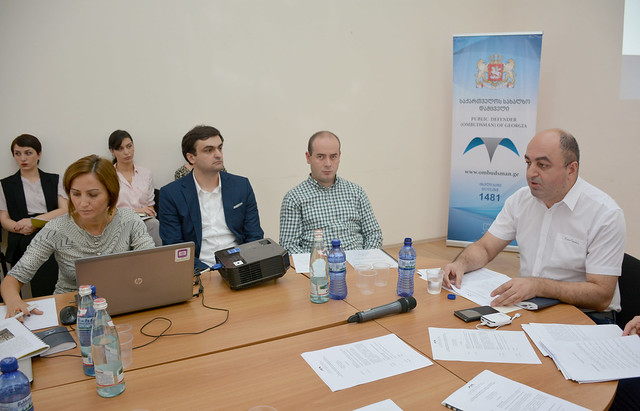Human Rights Situation in Villages along Samegrelo-Zemo Svaneti Dividing Line
On September 21, 2016, the Public Defender of Georgia presented a special report to the local non-governmental and international organizations in the city of Zugdidi about the socio-economic and security situations of people living along the dividing line between Samegrelo and Abkhazia, and reviewed the human rights situation of the populations of the villages of Khurcha, Pakhulani and Tskou.
The village of Khurcha of the Zugdidi municipality borders the village of Nabakevi of the Gali district. The village has been directly affected by violent conflicts several times. Khurcha is the only village on the other side of the Enguri River, which is controlled by Georgia. The Georgian police checkpoint is located at the beginning of the village and this creates safety problems for the rural population. A clear example of this was the murder of 22-year-old G.O. at the Khurcha-Nabakevi checkpoint on May 19, 2016. The Public Defender considers it important that the case be quickly and efficiently investigated through cooperation between the parties and the offender be punished, which would strengthen the sense of safety of the local population and create an important precedent of cooperation.
Illegal arrests on charges of "illegal border crossing" are frequent in the village of Khurcha, as well as other villages along the dividing line. Residents of Khurcha and Gali, including school children, have been among the detainees over the years.
Residents of the village of Khurcha demand full compensation for the loss suffered during the hostilities of 1993-1998 and 2008.
The Russian border guards erected wire fences in the Tsalenjikha villages of Pakhulani and Tskou in 2013, after which several houses of the village fell on the uncontrolled territory. The wire fences were erected in the agricultural lands of the village population and thus their access to the land has been restricted.
The absence of a bridge in the village of Pakhulani, connecting several districts of the village with each other, remains a problem. Also, the banks of the Ilori River need to be fortified, as during rainfall the swollen river floods agricultural lands.
The Public Defender prepared recommendations for relevant agencies in order to ensure protection of the rights of conflict-affected population and solution to the problem of social infrastructure in the villages along the dividing line. Specifically, the recommendations are:
To the Zugdidi Municipality Administration:
-Ensure rehabilitation of the ambulatory center in the village of Khurcha and equip it with necessary equipments;
-Examine once again the issue of compensation for the population of the village of Khurcha and make a decision in this regard; provide information of the examination results to the population of the village;
To the Tsalenjikha Municipality Administration:
-Allocate appropriate funds for the rehabilitation of the Ilori bridge in the village of Pakhulani and for the fortification of the riverbanks;
-Ensure construction and arrangement of an ambulatory center in the village of Pakhulani.
To the Ministry of Energy:
-Examine the issue of power supply to the village of Khurcha and take appropriate measures to ensure safety of the population and unrestricted enjoyment of electricity.
To the Ministry of Internal Affairs:
-Strengthen patrolling on the parts of the villages along the dividing line that are beyond the areal of the Georgian checkpoints (the villages of Khurcha and Tskou), especially near the dividing line, where population are at increased risk.
To the Temporary State Commission Addressing the Needsof the PopulationLiving in the Villages Adjacent to the Dividinglineand its individual members:
-Instruct appropriate member agencies (the Ministry of Agriculture, the Ministry of Economy and Sustainable Development) to examine the specifics of the villages located along the dividing line and develop industrial and agricultural promotion programs tailored to the specific needs and opportunities of the conflict-affected communities.
To the Ministry of Foreign Affairs; the State Minister's Office for Reconciliation and Civil Equality:
-Consolidate political, legal and diplomatic efforts to protect security and freedom of movement of the conflict-affected population, including school children; the efforts must include raising the issues during negotiations and relevant provision of information about the issue to the international community, as well as the use of international legal instruments.
To the Prosecutor's Office:
-Investigate the murder of citizen G.O., including through cooperation with the Abkhaz side; discuss the issue not in political but in legal context and adopt all necessary measures to punish the perpetrator.
See the electronic version of the special report
















